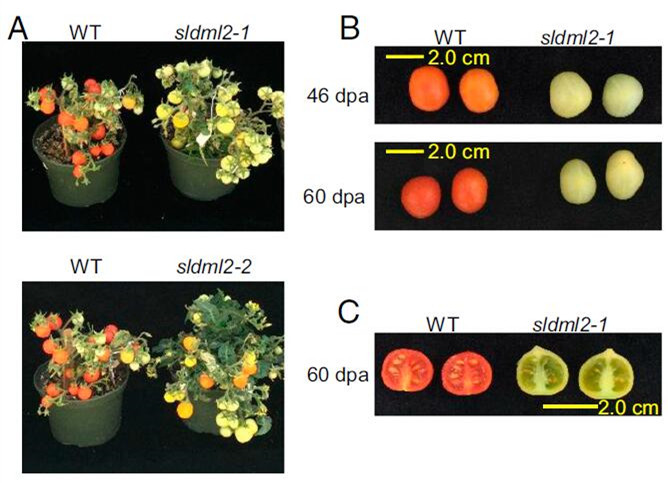
DNA methylation is a conserved epigenetic modification that is generally associated with inactive transcription in plants and mammals. In tomato, fruits undergo a dramatic loss in DNA methylation during ripening, suggesting that DNA methylation may play an important role in tomato fruit ripening. However, it is still unclear how DNA demethylation is involved in regulation of tomato fruit ripening.
Prof. ZHU Jiankang and Prof. LANG Zhaobo at Shanghai Institute of Plant Physiology and Ecology of Chinese Academy of Sciences, collaborating with researchers at Purdue University found that SlDML2-mediated DNA demethylation is required for both the activation of ripening-induced genes and the inhibition of ripening-repressed genes, and thus is required for tomato fruit ripening. This study was published in PNAS.
The Arabidopsis ROS1 family of bifunctional 5-methylcytosine DNA glycosylases/lyases, often referred to as DNA demethylases, can initiate active DNA demethylation by removing the methylcytosine base from the DNA backbone. Tomato contains four putative DNA demethylases (SlDML1-4) according to sequence homology with the Arabidopsis DNA demethylases, and two of them, SlDML1 and SlDML2, are most closely related to the Arabidopsis ROS1.
In this study, researchers generated loss-of-function mutant alleles of a tomato gene, SlDML2, which is a close homolog of the Arabidopsis DNA demethylase gene ROS1. In the fruits of the tomato mutants, increased DNA methylation was found in thousands of genes.
They characterized the DNA methylomes of the mutant fruits failing to ripen and discovered that SlDML2 is required for the demethylation and activation of genes for fruit ripening, including those involved in fruit pigment and flavor synthesis, ethylene synthesis and signaling, as well as cell wall hydrolysis.
Out of expectation, they found that SlDML2-mediated DNA demethylation is also necessary for fruit ripening-induced repression of hundreds of genes involved in photosynthesis and cell wall synthesis and organization.
This study has revealed a broad and critical role of DNA methylation as an activation mark for the expression of many genes in a eukaryotic organism.

Figure: Fruit-ripening phenotypes of tomato sldml2 mutants. A. Plants of the WT (cv. Micro-Tom), sldml2-1, and sldml2-2 at the same stage. All plants were from the T0 generation. B. Fruits of the WT andsldml2-1 at 46 dpa and 60 dpa. C) Photograph of the inside of fruits of the WT and sldml2-1 at 60 dpa.

86-10-68597521 (day)
86-10-68597289 (night)

86-10-68511095 (day)
86-10-68512458 (night)

cas_en@cas.cn

52 Sanlihe Rd., Xicheng District,
Beijing, China (100864)

